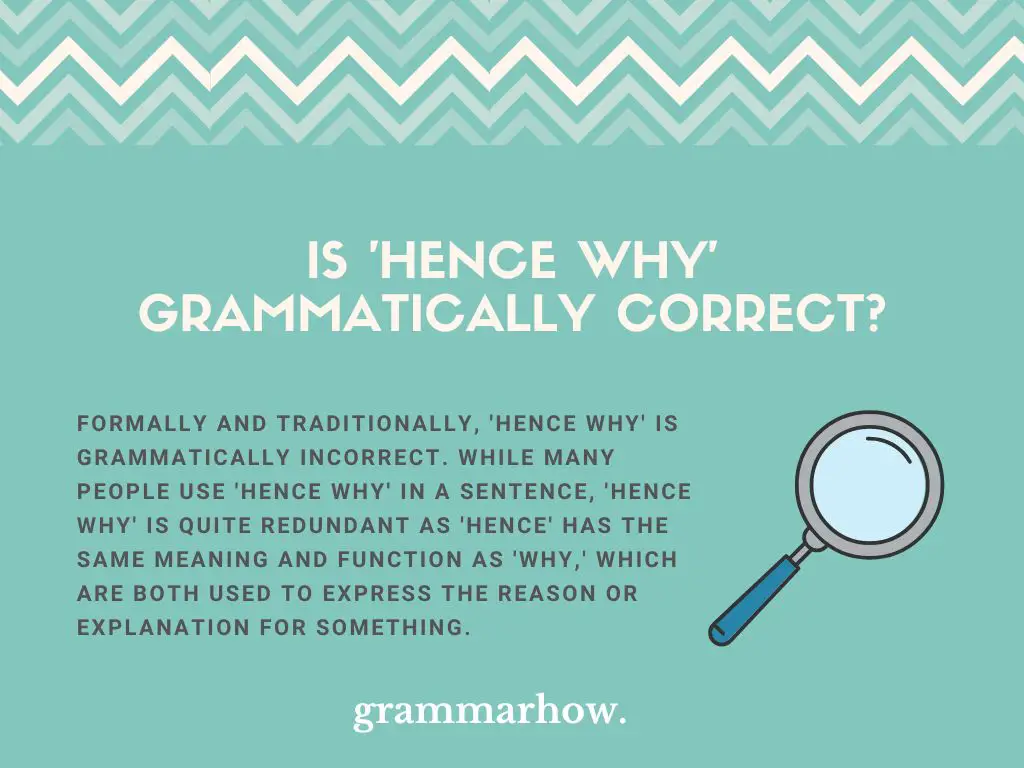The English language can be confusing at times, to the point that we make mistakes without knowing they’re mistakes. There are common mistakes people make in grammar, that we don’t ever correct as a whole.
Is ‘Hence Why’ Grammatically Correct?
Formally and traditionally, ‘hence why’ is grammatically incorrect. While many people use ‘hence why’ in a sentence, ‘hence why’ is quite redundant as ‘hence’ has the same meaning and function as ‘why,’ which are both used to express the reason or explanation for something.

‘Hence’ is an adverb that’s synonymous with ‘therefore.’ ‘Hence’ means or expresses the reason or explanation for something or as a result of something. Take a look at the example below.
- I didn’t like the orange flavor. Hence, I removed it from the recipe.
In the sentence above, ‘hence’ explains that the reason why the person removed oranges from the recipe was that the person didn’t like them.
On the other hand, we use ‘why’ to show the reason or explanation for something. Take a look at the example below.
- The shirt was dirty, that’s why I put it in the laundry.
In the sentence above, ‘why’ explains that the reason the person put the shirt in the laundry was that it was dirty.
This is where we see that the functions of ‘why’ and ‘hence’ overlap. Both are used to show the reason or explanation for something, and so, using them both together makes it redundant. While it’s not entirely incorrect, it’s still best to omit one of the two to remove redundancy.
Below are examples of how some people use ‘hence why’ in a sentence, which is not entirely grammatically correct.
- I can’t sleep, hence why I watched a movie.
- The colors faded, hence why I recolored them.
- I didn’t see any errors, hence why I passed my work.
- I couldn’t see properly, hence why I got new glasses.
- I couldn’t do anything about it, hence why I gave up.
‘Hence’ Instead of ‘Hence Why’
It is better to use ‘hence’ only instead ‘hence why.’ By removing ‘why,’ we also remove the redundancy as ‘why’ has the same function as ‘hence.’ Omitting ‘why’ does not change the meaning of your sentence and entirely makes it more coherent and cohesive.
‘Hence’ and ‘why’ in ‘hence why’ function in the same way and rather have the same meaning. Thus, omitting one of them doesn’t change the overall meaning of the sentence. Take a look at the example below.
- I didn’t like the show, hence why I turned it off.
- I didn’t like the show, hence, I turned it off.
The two sentences above certainly mean the same. In the first sentence, ‘hence why’ explains that the reason why the person turned off the show was that they didn’t like it. The second sentence, even with ‘hence’ only, still expresses the same thought that the reason the person turned off the show was that they didn’t like it.
Removing ‘why’ from ‘hence why’ does not change anything at all. Rather, it even makes the sentence better by making the sentence more coherent and cohesive by omitting the redundancy made by putting ‘hence’ and ‘why’ together when they mean just the same.
Below are examples of how to use ‘hence’ in a sentence.
- I love exploring new things. Hence, I always start new experiments.
- I can’t stand the heat. Hence, I traveled to a colder place.
- She wasn’t able to finish the test. Hence, she asked the teacher for a retake.
- Mary finished her work early. Hence, she also went home early.
- Darcy didn’t want to wake up. Hence, she slept in until lunch.
- I didn’t do laundry yesterday. Hence, I’m doing it later this afternoon.
- Gray changed his room’s painting. Hence, the vibes of the room are also different.
‘Hence Why’ Synonyms
Below are other synonyms for ‘hence why’ that can work better for less redundancy and more coherence and cohesiveness.
- Therefore
- So
- Thus
- On that account
- Consequently
Final Thoughts
While many of us use ‘hence why’ and don’t mind using it, it’s still grammatically incorrect, traditionally and formally. ‘Hence’ and ‘why’ together is redundant as they mean the same thing. It’s best and more appropriate to omit one of the two and use ‘hence’ only in the sentence.

Martin holds a Master’s degree in Finance and International Business. He has six years of experience in professional communication with clients, executives, and colleagues. Furthermore, he has teaching experience from Aarhus University. Martin has been featured as an expert in communication and teaching on Forbes and Shopify. Read more about Martin here.
